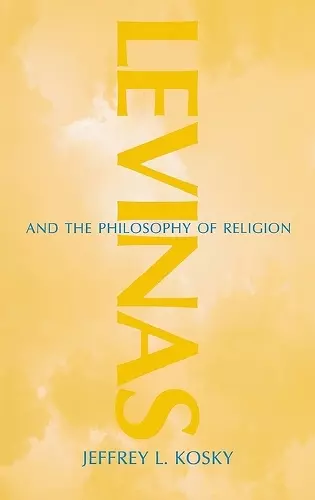Levinas and the Philosophy of Religion
Format:Hardback
Publisher:Indiana University Press
Published:12th Jul '01
Currently unavailable, and unfortunately no date known when it will be back

An original and nuanced investigation into the interplay of phenomenology and religion in Levinas's thought.
An interpretation of the ethical and religious dimensions of Levinas' thought. Placing Levinas in relation to Hegel and Nietzsche, Husserl and Heidegger, and Derrida and Marion, it develops the religious themes found in Levinas' work and offers a way to think and speak about ethics and morality within the horizons of philosophy of religion.
Levinas and the Philosophy of Religion
Jeffrey L. Kosky
Reveals the interplay of phenomenology and religion in Levinas's thought.
"Kosky examines Levinas's thought from the perspective of the philosophy of religion and he does so in a way that is attentive to the philosophical nuances of Levinas's argument. . . . an insightful, well written, and carefully documented study . . . that uniquely illuminates Levinas's work." —John D. Caputo
For readers who suspect there is no place for religion and morality in postmodern philosophy, Jeffrey L. Kosky suggests otherwise in this skillful interpretation of the ethical and religious dimensions of Emmanuel Levinas's thought. Placing Levinas in relation to Hegel and Nietzsche, Husserl and Heidegger, Derrida and Marion, Kosky develops religious themes found in Levinas's work and offers a way to think and speak about ethics and morality within the horizons of contemporary philosophy of religion. Kosky embraces the entire scope of Levinas's writings, from Totality and Infinity to Otherwise than Being, contrasting Levinas's early religious and moral thought with that of his later works while exploring the nature of phenomenological reduction, the relation of religion and philosophy, the question of whether Levinas can be considered a Jewish thinker, and the religious and theological import of Levinas's phenomenology. Kosky stresses that Levinas is first and foremost a phenomenologist and that the relationship between religion and philosophy in his ethics should cast doubt on the assumption that a natural or inevitable link exists between deconstruction and atheism.
Jeffrey L. Kosky is translator of On Descartes' Metaphysical Prism: The Constitution and the Limits of Onto-theo-logy in Cartesian Thought by Jean-Luc Marion. He has taught at Williams College.
Indiana Series in the Philosophy of Religion—Merold Westphal, general editor
May 2001
272 pages, 6 1/8 x 9 1/4, bibl., index, append.
cloth 0-253-33925-1 $39.95 s / £30.50
Readers will find Jeffrey Kosky's book a helpful addition to the secondary material on Levinas. Attention to Levinas continues to increase as do the quality and number of secondary pieces interpreting his work. In keeping with the writings of John Caputo and Dennis Keenan, Kosky (independent scholar) presents Levinas as a phenomenologist who engages religious subjects without denying the important shift beyond ontotheology made by Nietzsche and Heidegger. Kosky focuses on responsibility as the key to unlocking the religious possibilities within Levinas. This insight is not new, but it bears repeating. Kosky concludes his text by showing that Levinas's religion is rooted in undecidability. One knows not of what one speaks, when one speaks of God. This insight is as refreshing now as it was when Augustine stated it in the first book of the Confessions. Kosky does an excellent job of drawing our attention to Levinas as one of the great 20th-century thinkers who refuses to deny God while simultaneously refusing to claim to know anything about God. Graduate students and scholars of Levinas, as well as those in the area of the philosophy of religion, should read this text.September 2002
-- D. J. Livingston * Mercyhurst ColleISBN: 9780253339256
Dimensions: unknown
Weight: 567g
264 pages